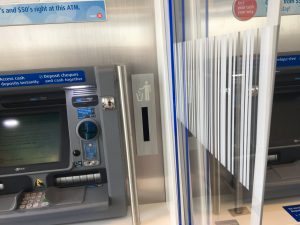 Here’s my small wordnerdy nitpick in the interests of accuracy: All those workplaces installing barriers to protect employees and customers during the pandemic are not necessarily using “Plexiglas.” That’s a brand name, like Kleenex. The generic term is “acrylic” or “acrylic plastic.”
Here’s my small wordnerdy nitpick in the interests of accuracy: All those workplaces installing barriers to protect employees and customers during the pandemic are not necessarily using “Plexiglas.” That’s a brand name, like Kleenex. The generic term is “acrylic” or “acrylic plastic.”
Oh, I’m the first one to say I need a Kleenex rather than a generic “tissue.” And who asks for an “adhesive bandage” over a Band-Aid? But both terms, like Plexiglas®, are brand names that are morphing into common names.
Of course, it’s okay to use a brand name if that is what’s being used. If not, that’s considered trademark erosion, or the more alarming-sounding genericide.
Shouldn’t a company be proud to have their product become the go-to name? You might think so, but no. Trademarks stand for more than the actual goods or services; they stand for the company’s reputation. What if someone has a bad experience with a product that’s not as good as yours but they think it’s yours? That makes trademarks valuable intellectual property, and companies spend millions of dollars to protect them and avoid having them used as a common name.
In 2014, Consumer Reports listed 15 products that have been “genericized,” like Aspirin and Thermos. Some of the ones then listed as “in danger” have already crossed the line, like Band-Aid and Kleenex. And yes, Plexiglas. Some you may never have known were brand names, like Dumpster.
The Canadian Press Stylebook advises avoiding a trademark by substituting a general term. It offers a handy list of “trademarks often encountered in news stories,” and their generic alternatives, including these:
- Baggies: Plastic bags
- Coca-Cola, Pepsi-Cola: Cola drink
- EpiPen: Epinephrine injector (doesn’t THAT roll off the tongue?)
- Jacuzzi: Whirlpool or hot tub
- Javex: Bleach
- Levi’s: Jeans
- Lysol: Disinfectant
- Realtor (or the annoying all-cap-for-no-reason REALTOR®): Real estate agent
- Saran Wrap: Plastic wrap
- Scotch tape: Adhesive tape
- Styrofoam: Plastic foam
- TelePrompTer: Cueing device (seriously??)
- Taser: Stun gun
So, while we can all be cheered that businesses are putting up barriers to keep customers and employees socially distanced, please join me and the Plexiglas® lawyers in calling them “acrylic.”
Full disclosure: I know people who are/were in the acrylics business, which is probably the only reason the rampant use of Plexiglas caught my attention.
